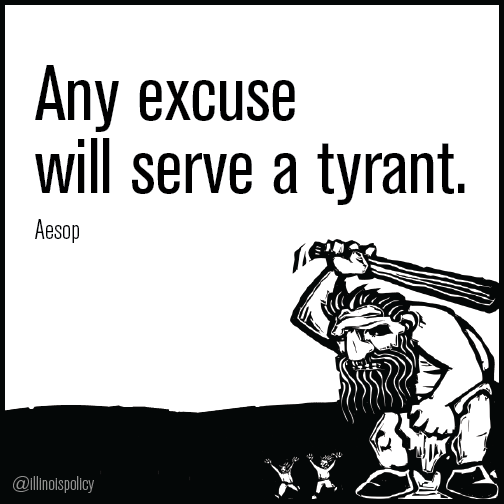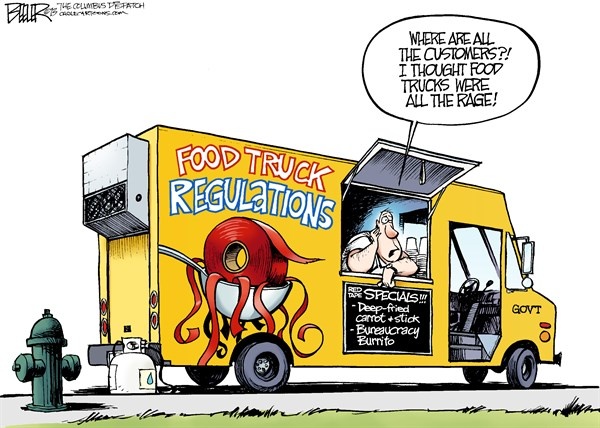QUOTE OF THE DAY
Crain’s Chicago: Chicago needs to legalize its street vendors
Why has Chicago given special permission to nonprofit E.A.T. Chicago to sell tofu scramble wraps on sidewalks downtown, calling the idea an innovative “emerging business,” while longstanding traditional vendors are arrested for selling tamales in Little Village?
Chicago’s vendors have been pleading for the city to legalize them for decades. Under current law,vendors cannot get a license to sell food from a pushcart, even if they have taken the city’s food safety classes and are eligible to manage restaurant kitchens. Sidewalk vendors live in fear of the police, who occasionally ticket them, throw away their inventory or arrest them. Other entrepreneurs, who dream of starting a small food business by selling iced coffee or bagels or salads from a cart or bicycle trailer, are denied licenses at City Hall, and their dreams (and businesses) never get off the ground.
In contrast, Mayor Rahm Emanuel’s office announced in August that E.A.T. had received the first“emerging business license” from the Department of Business Affairs and Consumer Protection. The emerging business license was created in 2012 so that the city could grant a temporary license to an innovative business that the City Council had not previously considered, giving the business time to get started and the City Council time to write new laws.
Daily Herald: Hinsdale teacher contract dispute could impact region
A contract dispute that threatens to trigger a teachers strike in Hinsdale High School District 86 could have far-reaching effects on similar talks throughout the suburbs, officials on both sides of the debate say.
The stalemate in the yearlong negotiations centers on several common contract issues, but with some twists.
For one, school board members, who say they’re looking to hold the line on salaries and benefits, placed an advisory referendum question on the November ballot asking voters if teachers should continue to receive 6 percent annual pay increases during their last four years on the job. In addition to giving teachers more money, critics say, those raises also serve to pad their pensions.
ChicagoNow: Cronyism can’t save Sears
Governments offer tax incentives to big businesses as a means to improve bottom lines. But sometimes, this taxpayer money ends up serving as life support, pumping funds into companies that are doomed to fail on their own (see: Solyndra).
Sears Holdings Corp. is one such example.
The retail giant has been in a steady downward spiral for years, and evidence that things aren’t getting any better continues to make headlines. On Jan. 21, the company announced the closure of its State Street location. Most recently, Sears announced that it may close more stores, in addition to the 130 closings already planned for 2014.
Crain’s: Lampert agrees to lend Sears $400 million
Billionaire hedge-fund manager Edward Lampert said today in a filing with the Securities and Exchange Commission that his investment company, ESL Investments Inc., is lending thestruggling Hoffman Estates-based retailer $400 million.
The loan is scheduled to mature at yearend and there is an option to extend it until Feb. 28, 2015.
The loan is secured by a lien on 25 real estate holdings owned by Sears. It’s a two-stage loan: The first $200 million was funded at the close of Wall Street trading today, and another $200 million will be funded on Sept. 30, according to the filing. The company expects to use the proceeds for “general corporate purposes.”
Politico: Chicago tops list of Obama library finalists
The foundation tasked with planning Barack Obama’s presidential library has narrowed down the list of potential hosts to four finalists, with the University of Chicago widely seen as the most likely choice.
The University of Illinois at Chicago, Columbia University and the University of Hawaii are the three other finalists that have been asked to respond to the Barack Obama Foundation’s request for proposal, the foundation said Monday.
The universities have until Dec. 11 to respond to the RFP with detailed plans for their projects, and the foundation’s board, led by Obama friend Marty Nesbitt, is expected to share recommendations with the president and first lady Michelle Obama by early 2015. The Obamas will make the final decision on where to build the library.
Yahoo: How the government could have destroyed Yahoo
Imagine a well-known, publicly traded company suddenly ceased operating, and the CEO couldn’t explain why. Picture shareholders losing everything, with zero warning.
This might sound like Soviet-style intrigue or Ayn Randian dystopia. But this bizarre scenario could have unfolded in the United States in 2008, when the government tried to force Yahoo (YHOO), the corporate parent of Yahoo Finance, to turn over data on select users as part of the National Security Agency’s PRISM electronic surveillance program. Yahoo fought the government’s request and appealed a secret court order to turn over the data, which led the government to threaten an escalating series of fines that could have overwhelmed Yahoo within weeks.
At Yahoo’s request, a federal judge recently unsealed 1,500 pages of classified documentsshowing how the company battled government in the secret court. The New York Times, first to report the story, cited documents showing the government threatened to fine Yahoo $250,000 per day if it refused to provide the data a secret body called the Foreign Intelligence Surveillance Court (FISC) ordered Yahoo to turn over to the NSA.
Variety: Labor Board Orders CNN to Rehire 100 Fired Employees
The National Labor Relations Board has ordered CNN to rehire 100 workers and compensate 200 others for a labor dispute that originated in 2003.
The 11-year dispute stems from CNN’s decision to replace a unionized subcontractor called Team Video Services, which provided the network with audio and video technicians, with an in-house nonunion work force in its Washington and New York bureaus.
The decision comes weeks after CNN’s top boss Jeff Zucker hinted at additional job cuts at the Turner-owned news channel, which employs over 2,000 people.
Daily Herald: Chicago Executive gets $6.4 million grant
Chicago Executive Airport in Wheeling and Prospect Heights will get nearly $6.4 million in federal funds for infrastructure improvements and upgrades, funneled through the Illinois State Block Grant Program.
This grant will be used to enhance operational safety on the airport’s primary runway, improving access to the airfield for major employers and economic drivers in the region. “Chicago Executive Airport provides direct access to the region for important businesses and job creators,” said U.S. Sen. Dick Durbin. “If we’re going to continue growing our local economy by supporting the businesses we have here and attracting new ones to the region, we need to keep looking forward and investing in our infrastructure.” The Block Grant Program provides funding for improvements at non-primary airports in the state of Illinois.
Washington Post: Should we ban states and cities from offering big tax breaks for jobs?
Tesla announced earlier this month that it’s planning to build a $5 billion lithium battery factory just outside of Reno, which sounds good for Nevada and bad for losing bidders California, Texas, Arizona and New Mexico. So how did Nevada beat out so many competitors?
The state offered the electric-car maker up to $1.3 billion in tax breaks and subsidies in exchange for the highly coveted “gigafactory,” which lawmakers hope could bring 20,000 jobs and $100 billion in economic impact to the state over the next 20 years. Governor Brian Sandoval declared that the deal had changed the state’s trajectory. Nevada legislators unanimously approved it. “This is arguably the biggest thing that has happened in Nevada,” one of them said, “since at least the Hoover Dam.”
Yet in an alternate universe — one where states don’t go to economic war over tech companies, corporate headquarters or auto plants — it seems logical that Tesla would still have to build its battery factory somewhere(maybe even Nevada). And if everyone weren’t bidding for the facility, setting off an arm’s race of tax abatements and public subsidies, no one would have to pay them.
Reason: Who Wants to Know the Finalists Competing for President Obama’s Library?
The Barack Obama Foundation on Monday announced four locations as potential sites for President Obama’s presidential library and museum.
Columbia University, the University of Hawaii, the University of Chicago and the University of Illinois at Chicago are all set to submit official proposals to house the library. Each of the universities demonstrated in initial proposals the ability to develop and design the library and enhance economic development in the communities in which they reside, according to officials with the foundation.
Crain’s Chicago: Why is it so hard to be a boutique owner in Chicago?
To open an independent brick-and-mortar shop requires a certain amount of optimistic—or perhaps delusional—thinking. Yes, consumers often can shop online for the same items. And yes, half of small businesses fail within five years. And yes, winters in Chicago are awful and operating costs in Chicago are high. But your idea is so brilliant, you just know you’re going to succeed.
Here are the stories of three entrepreneurs (and their partners) who tried and gave up.
Charles Munger, vice chairman of Berkshire Hathaway, the other day described Silicon Valley billionaire Elon Musk as a “genius.” Maybe he was alluding to the Tesla CEO’s cunning ploy to mine subsidies from Nevada taxpayers.
Last week the Silver State’s legislature unanimously approved $1.3 billion in tax breaks for Tesla to build a $5 billion lithium battery factory in Reno that will supply its electric-car plant in Fremont, California. “We have changed the trajectory of this state, perhaps forever,” declared Republican Gov. Brian Sandoval, who wagers that the “Gigafactory” will grow the state’s economy by $100 billion, or about 80%, over 20 years. Will he take that bet to Vegas?
Politicians bribing businesses to locate in their state is an old if unfortunate story. Tennessee this year offered Volkswagen VOW3.XE -0.54% $274 million to expand its Chattanooga plant. Last year Washington awarded long-time employer BoeingBA +0.05% $8.7 billion over 16 years to build its new 777X jetliner in Puget Sound.
CARTOON OF THE DAY

